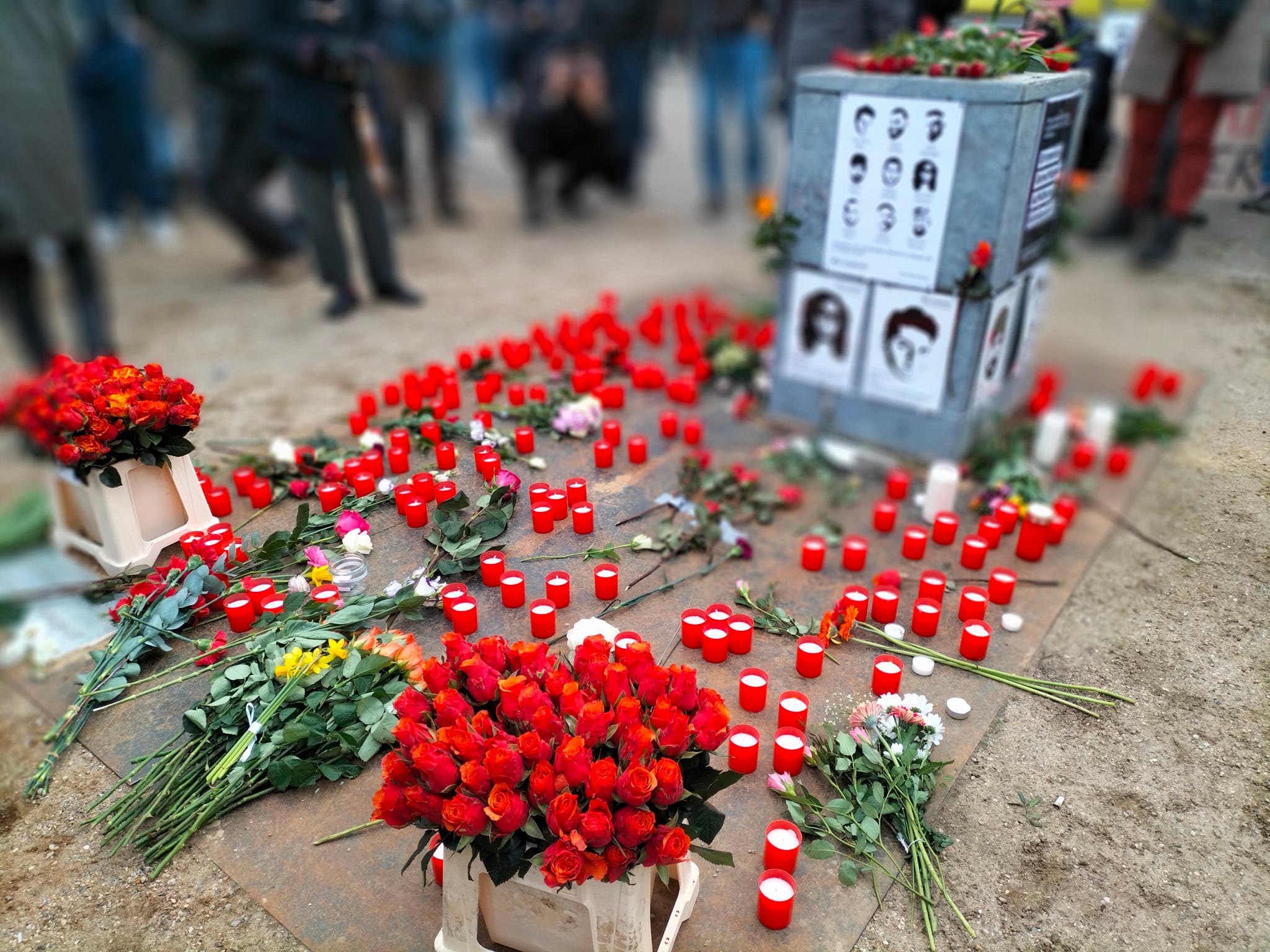
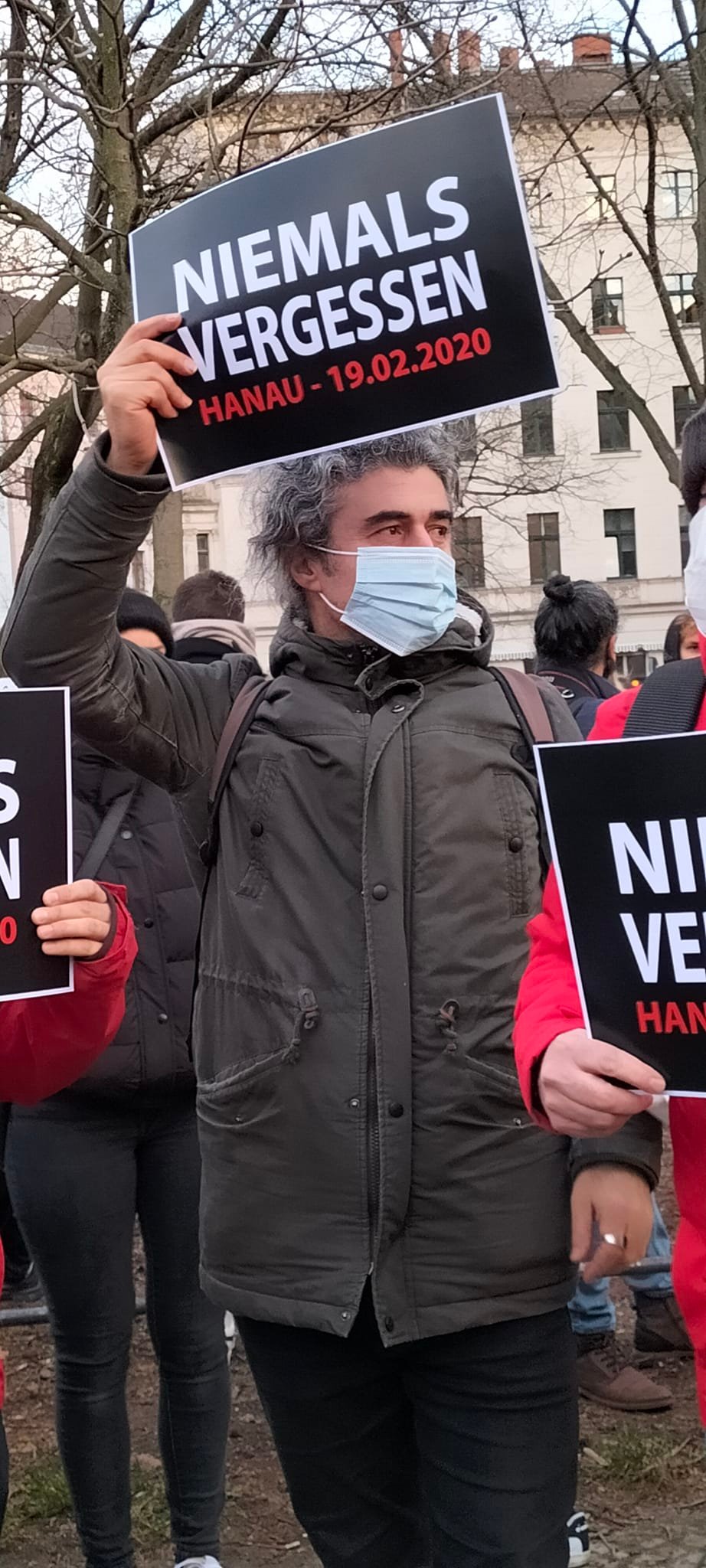
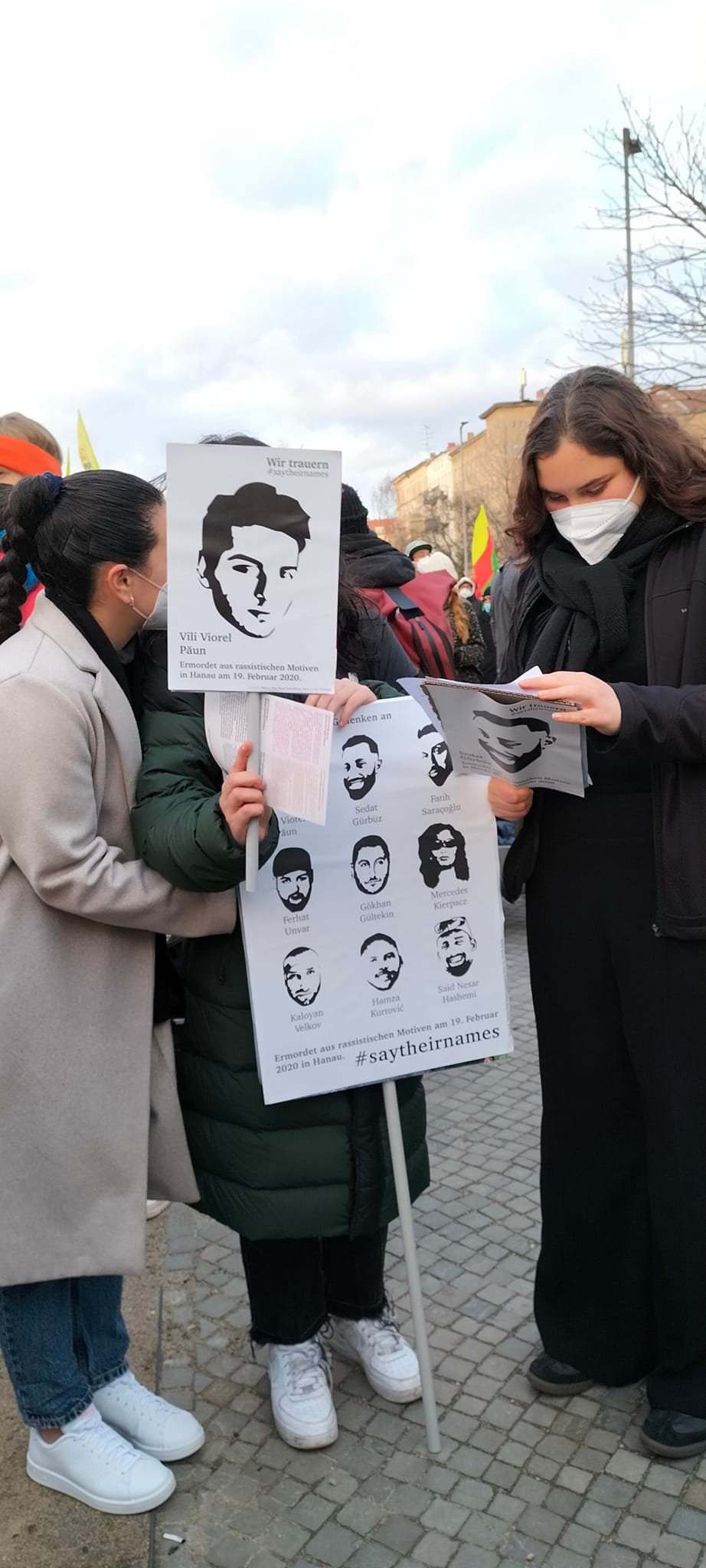
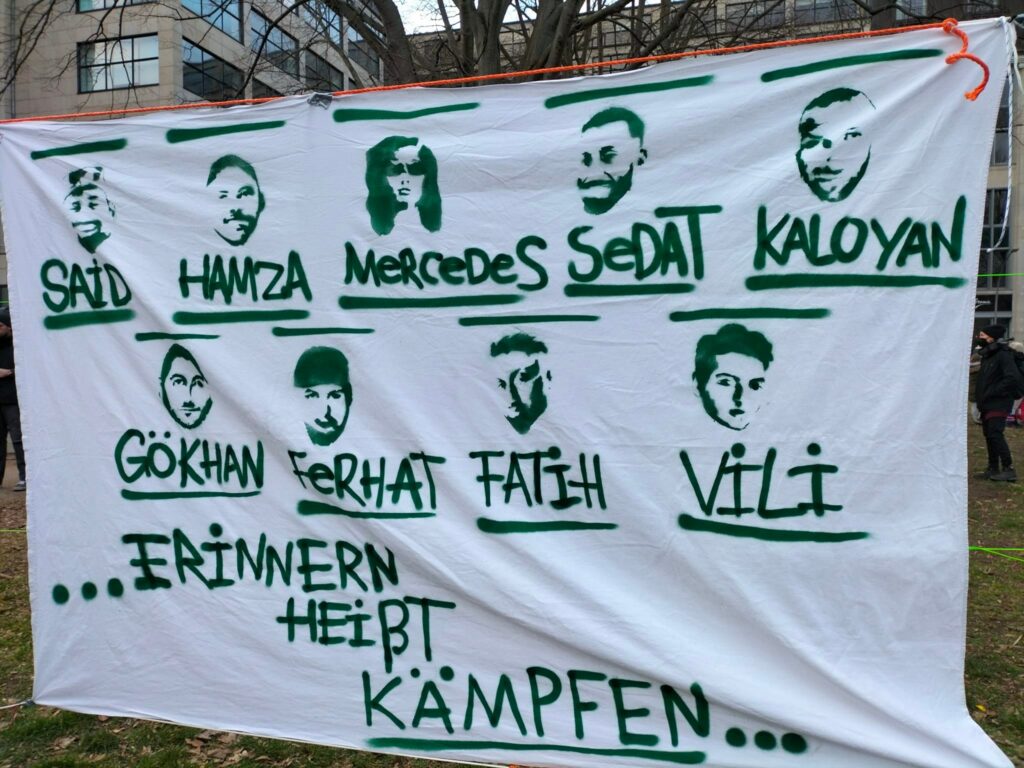
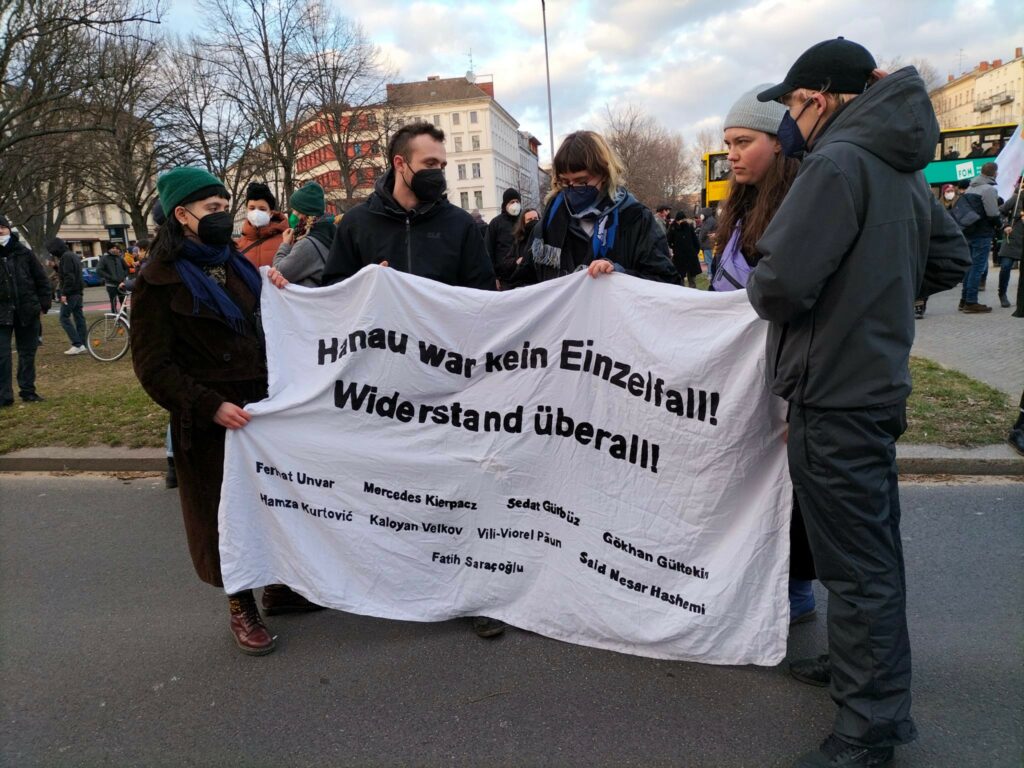
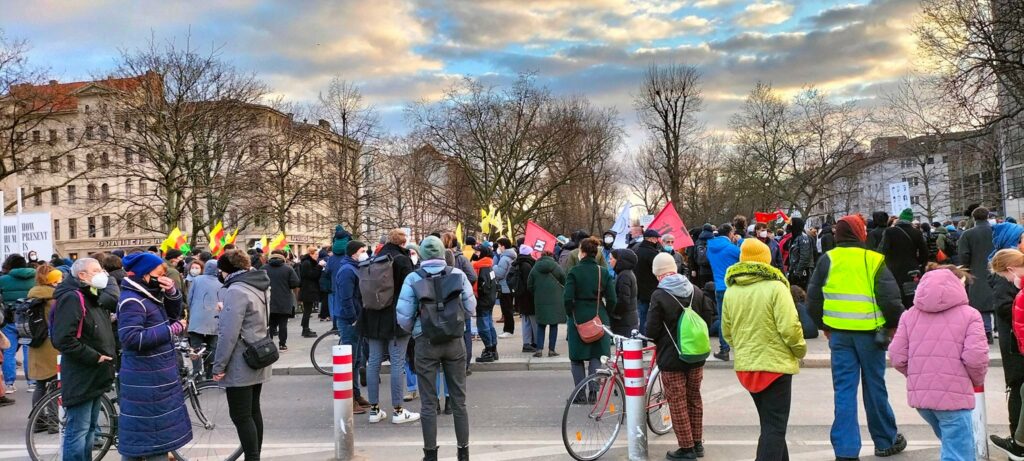
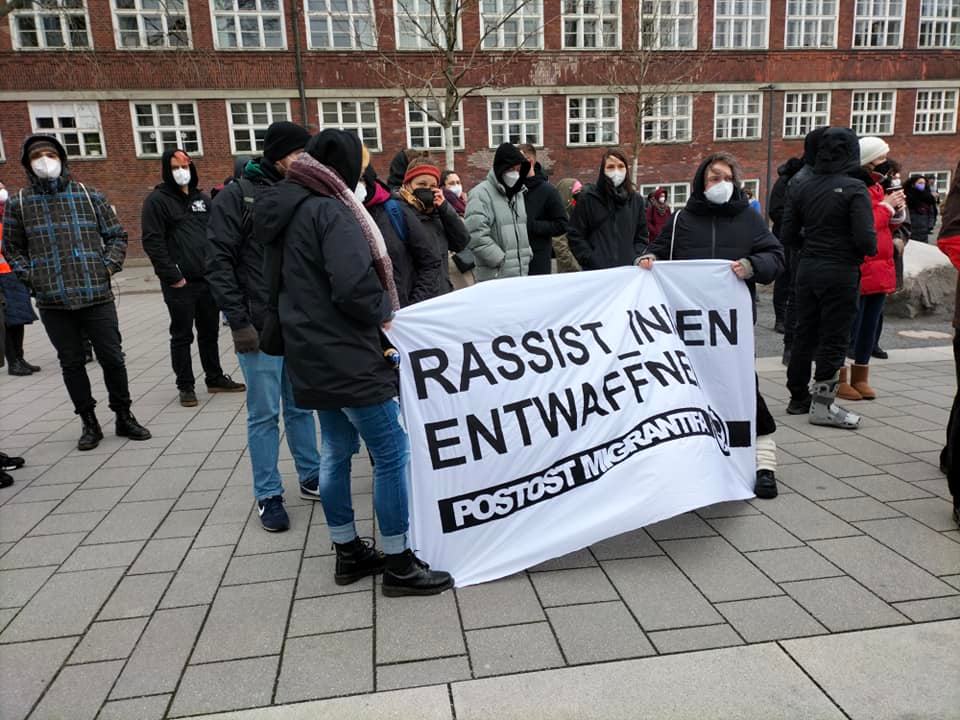
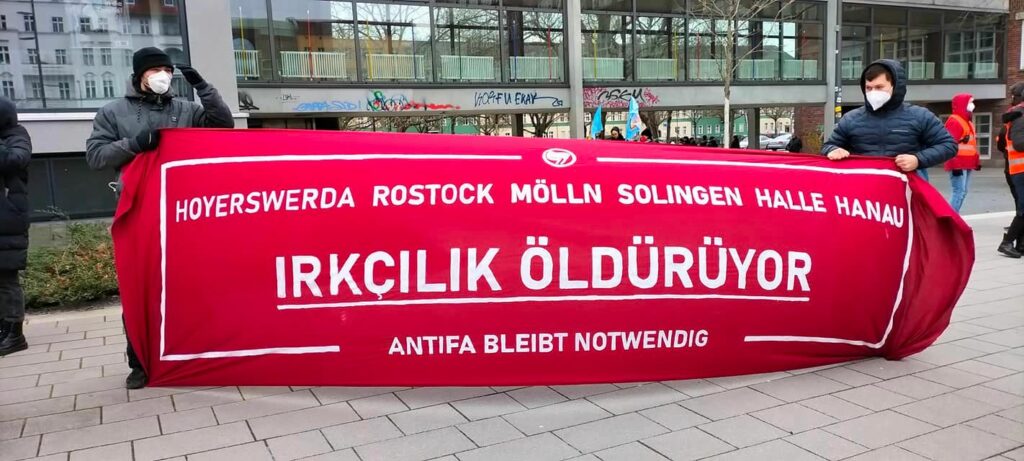
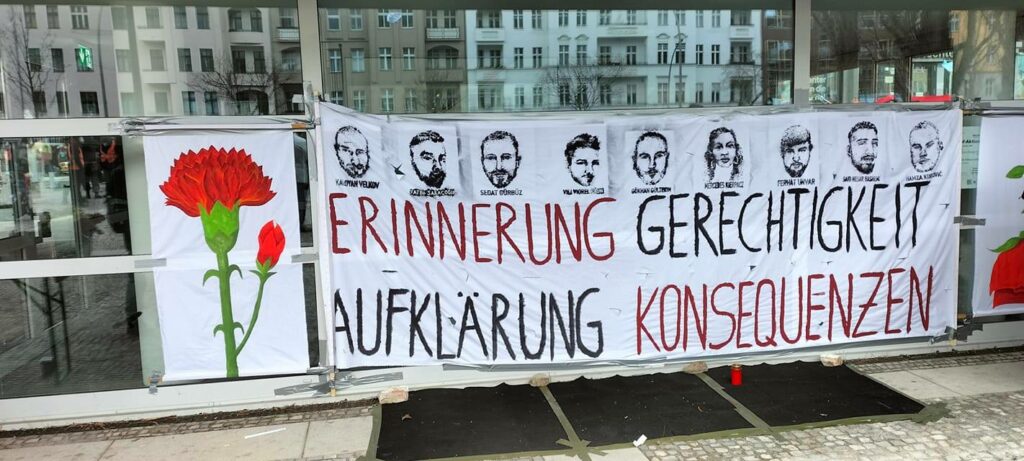
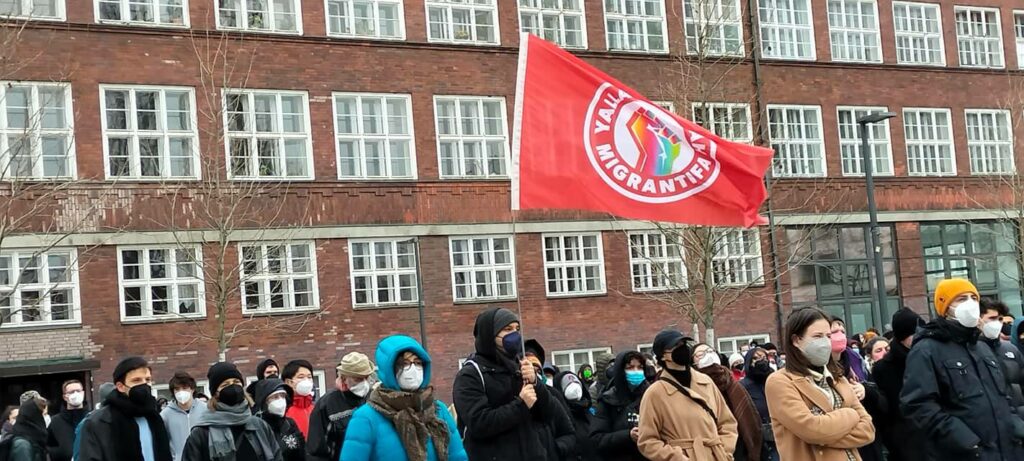
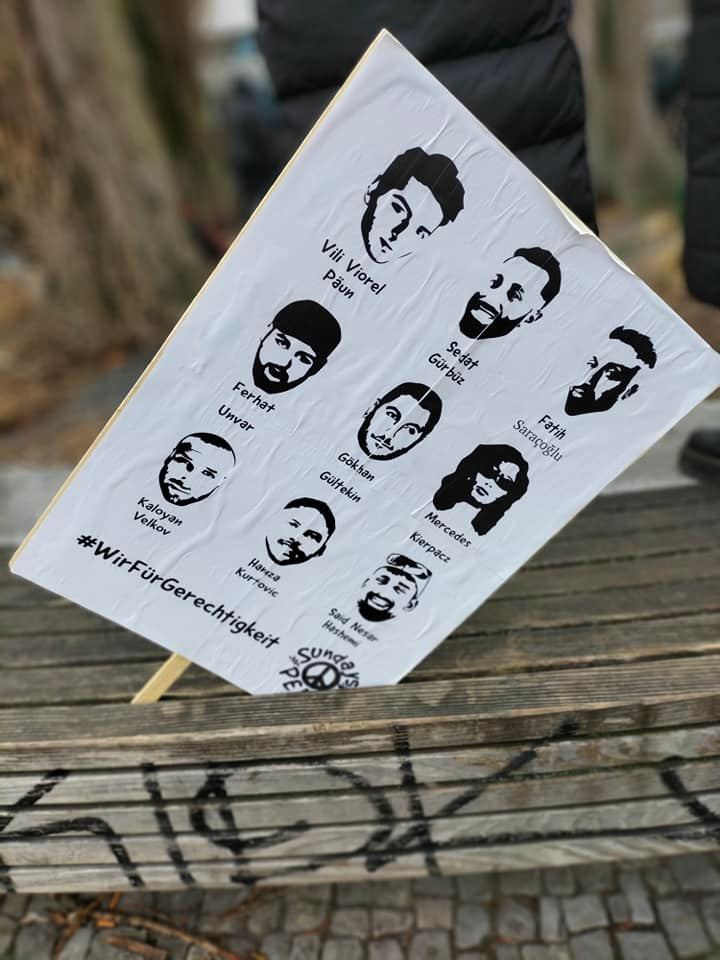
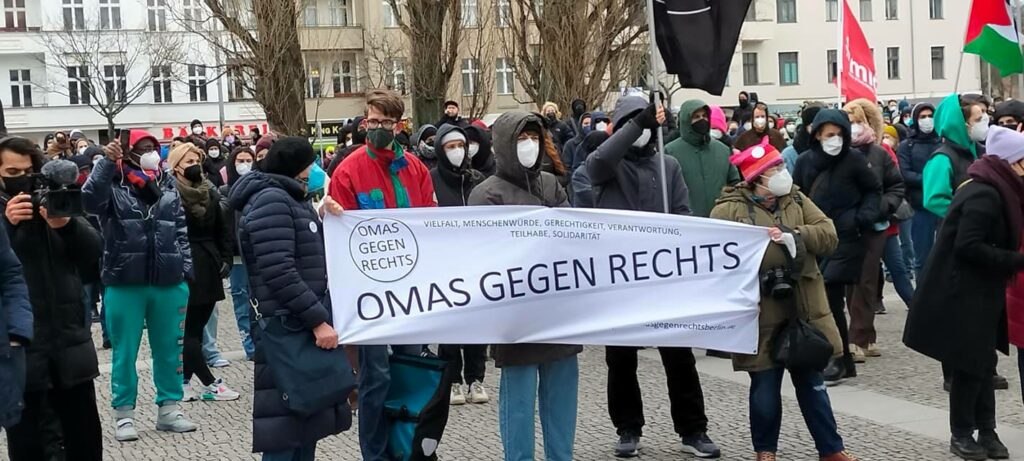
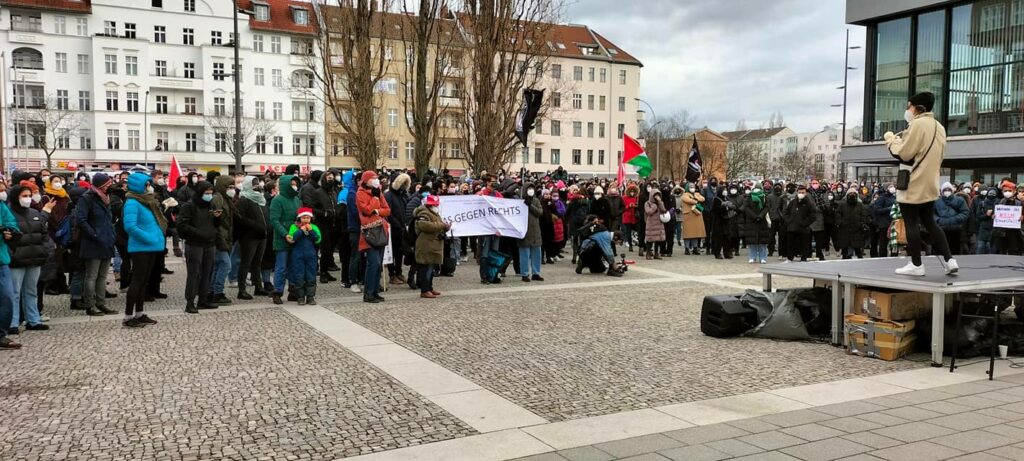
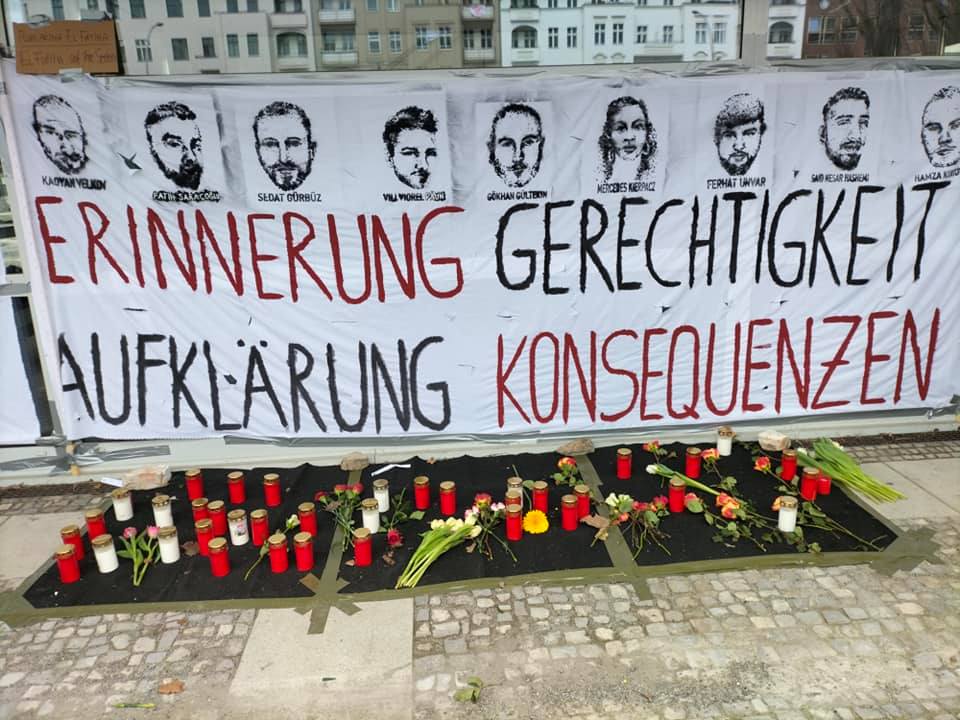
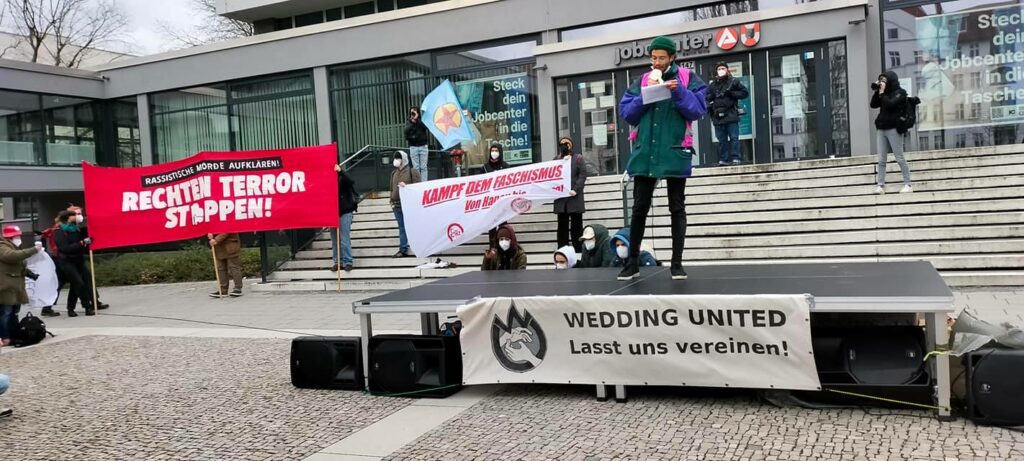
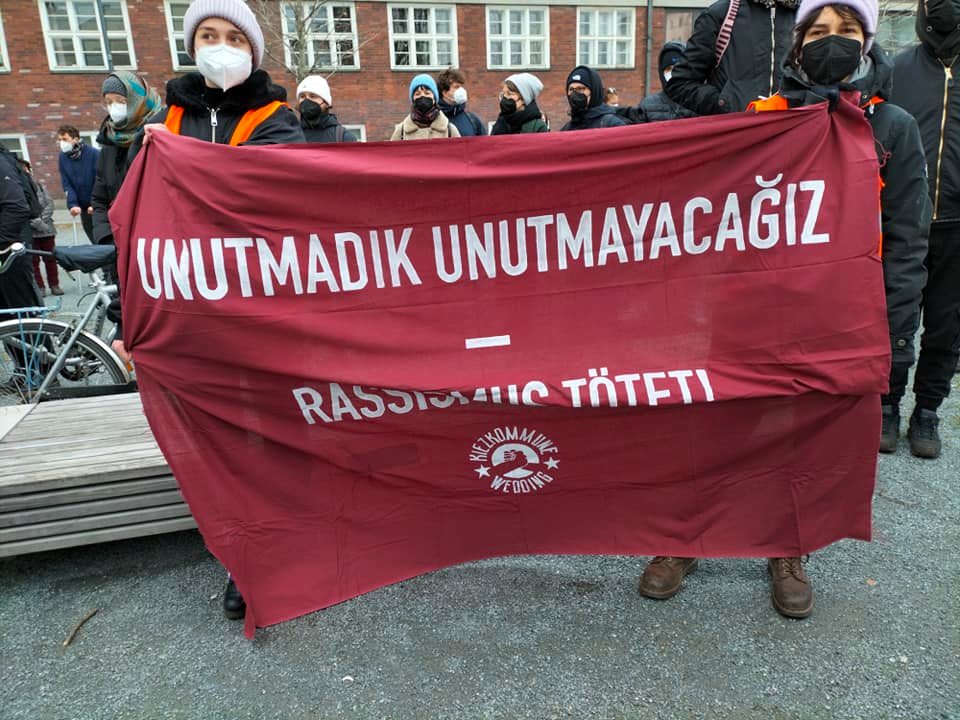
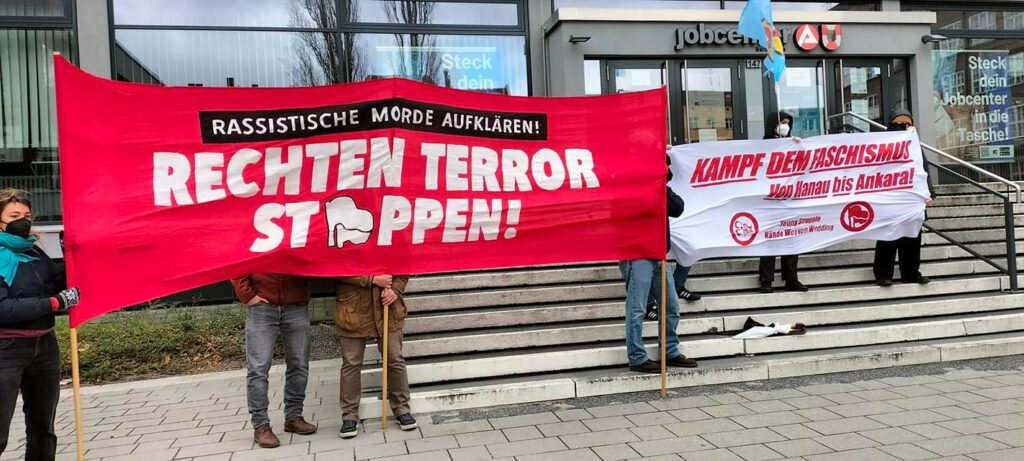
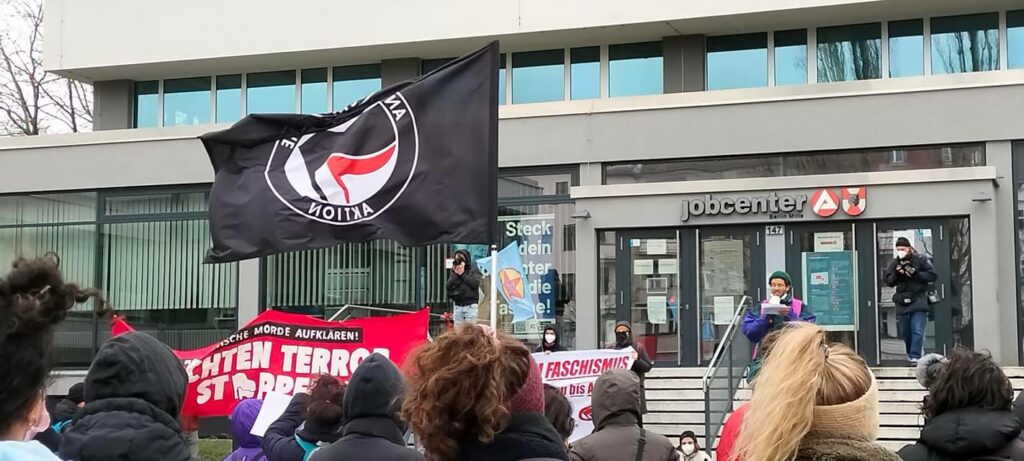
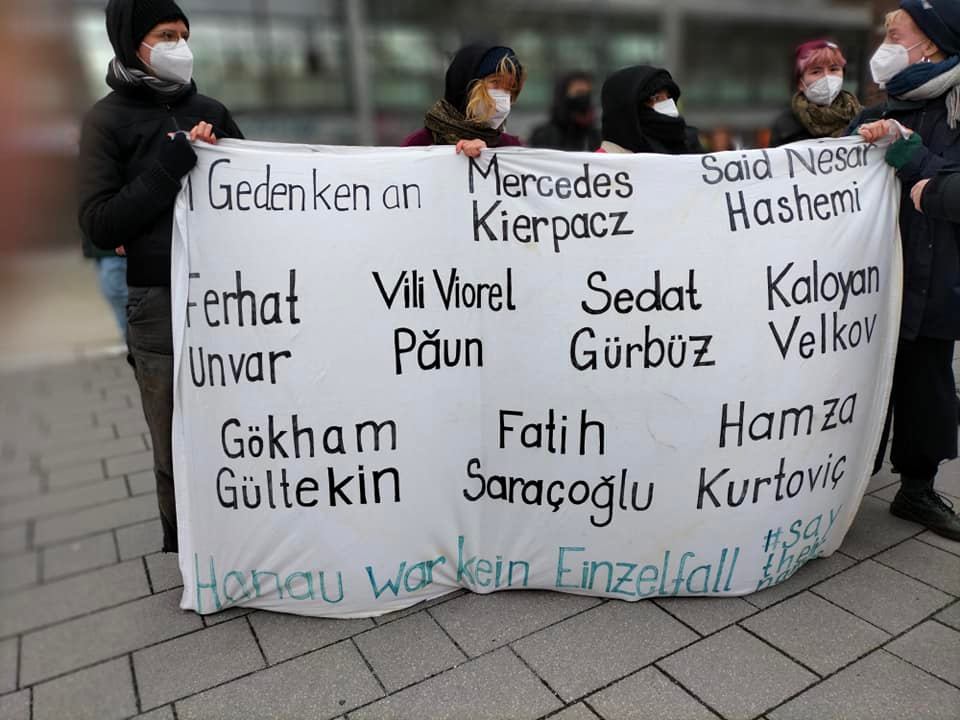
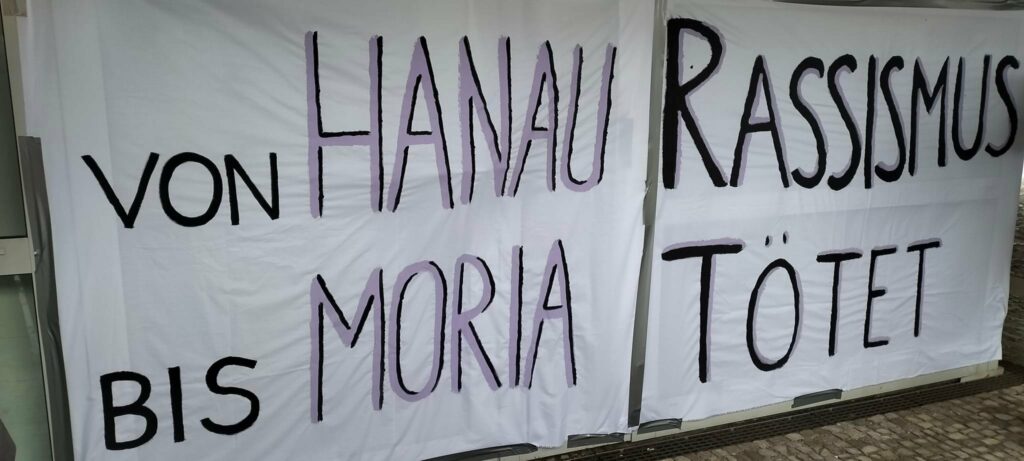
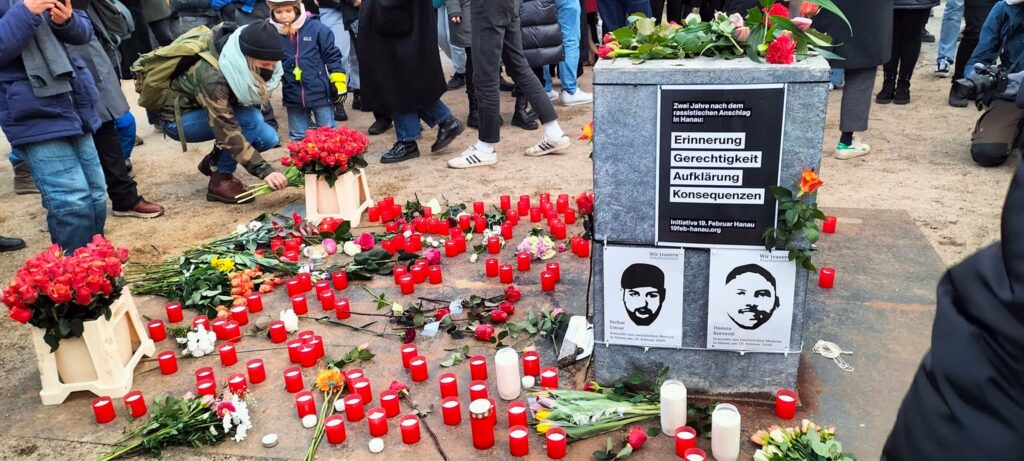
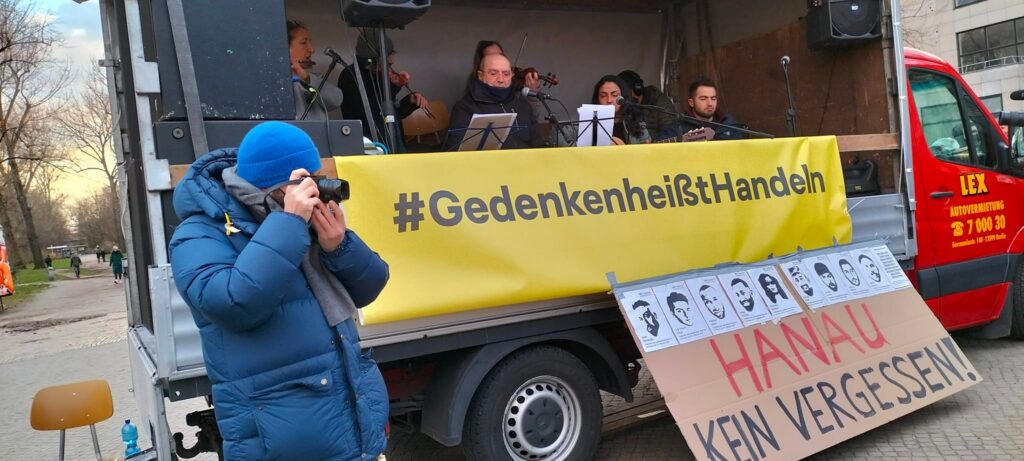
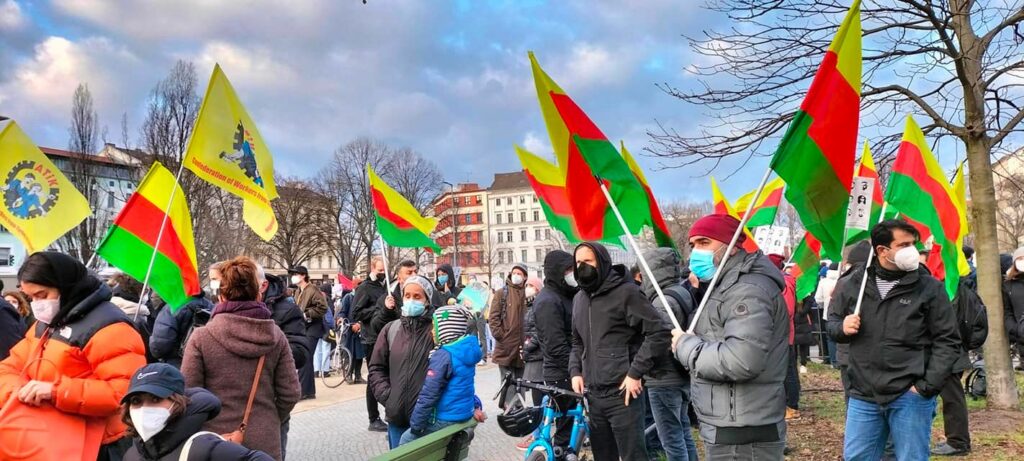
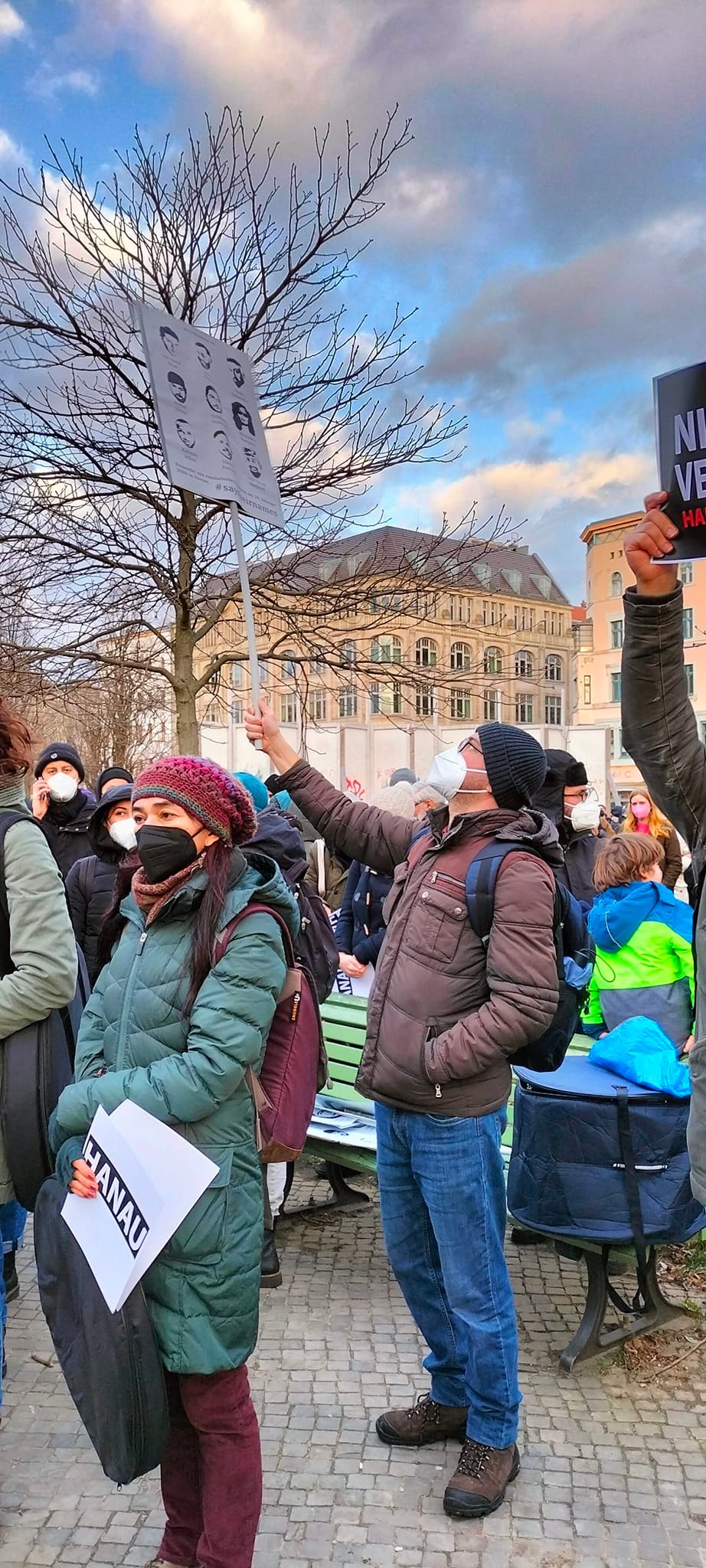
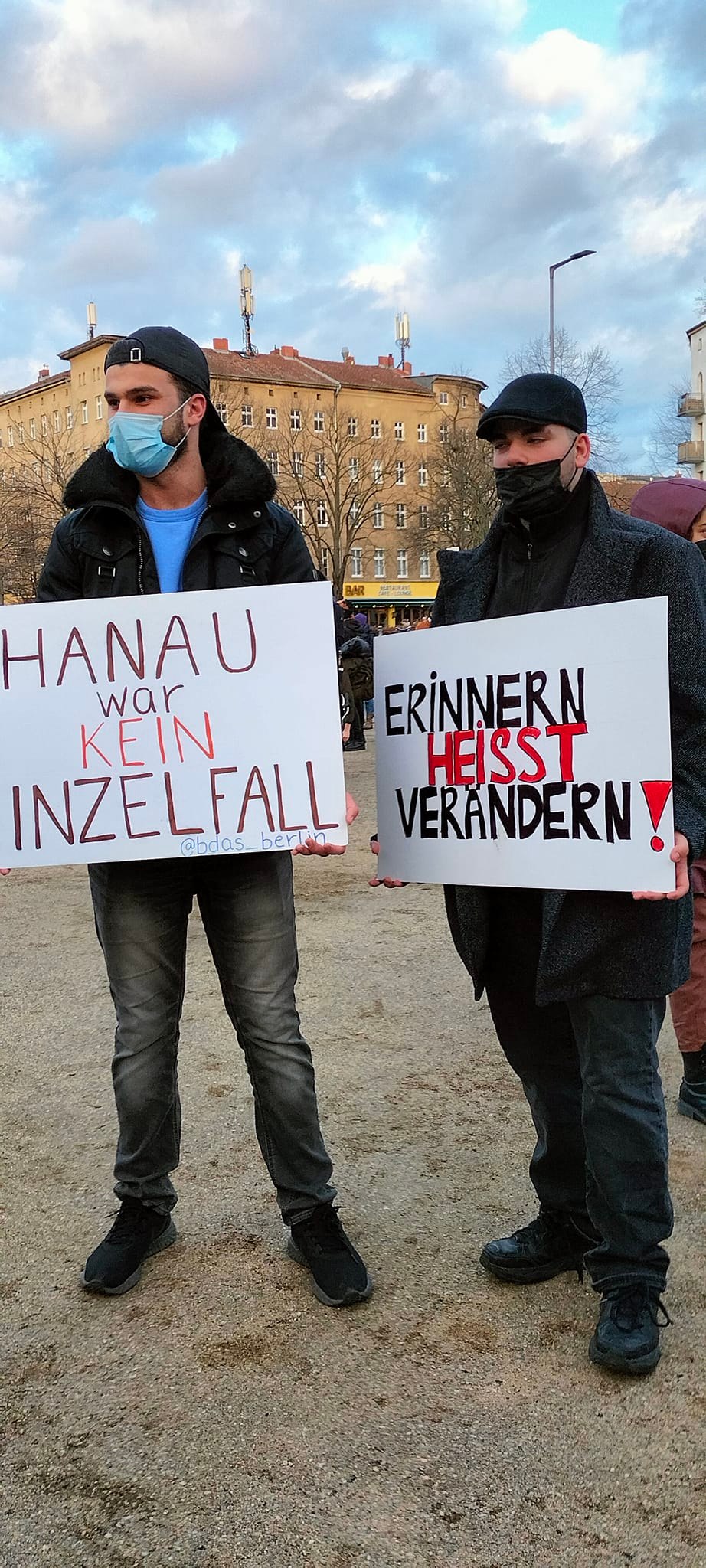
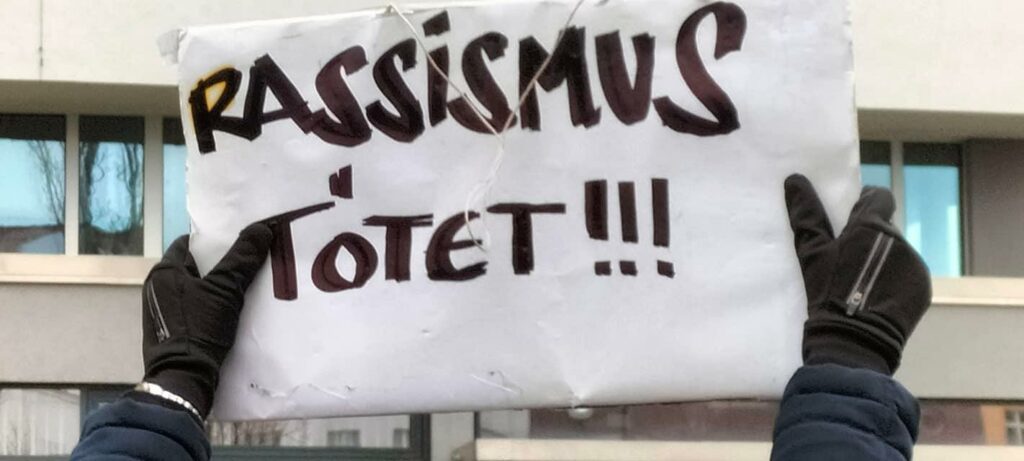
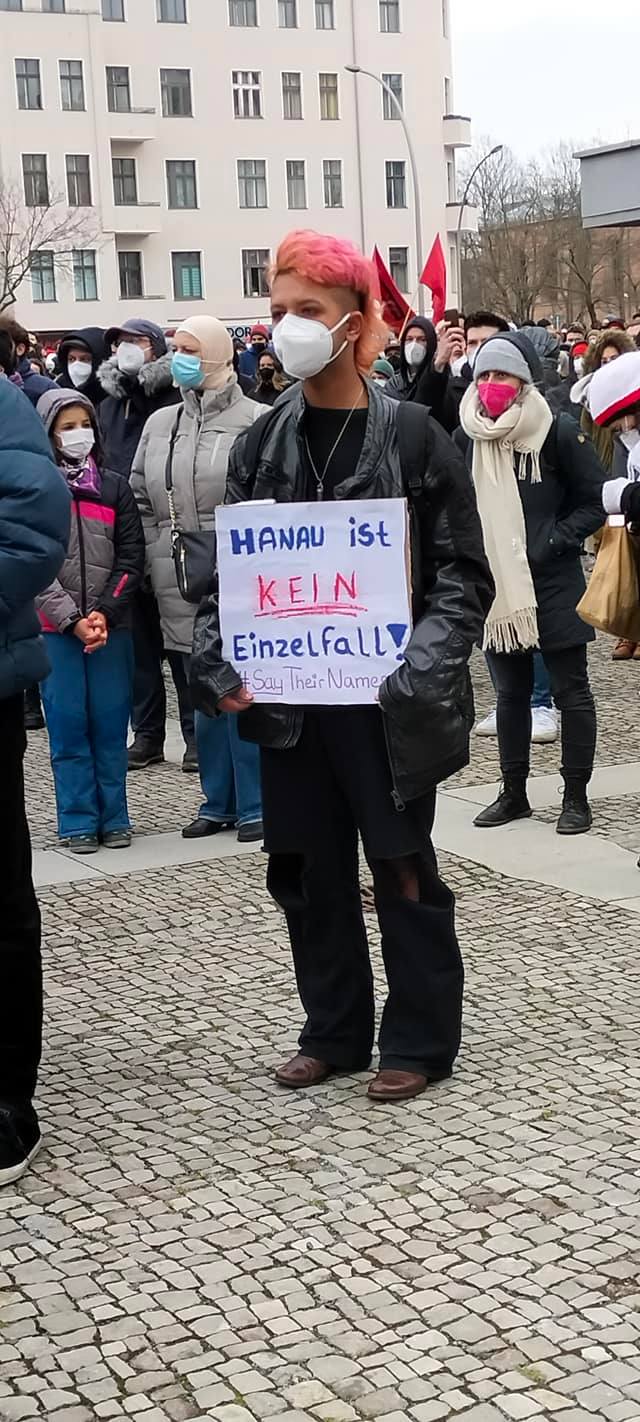
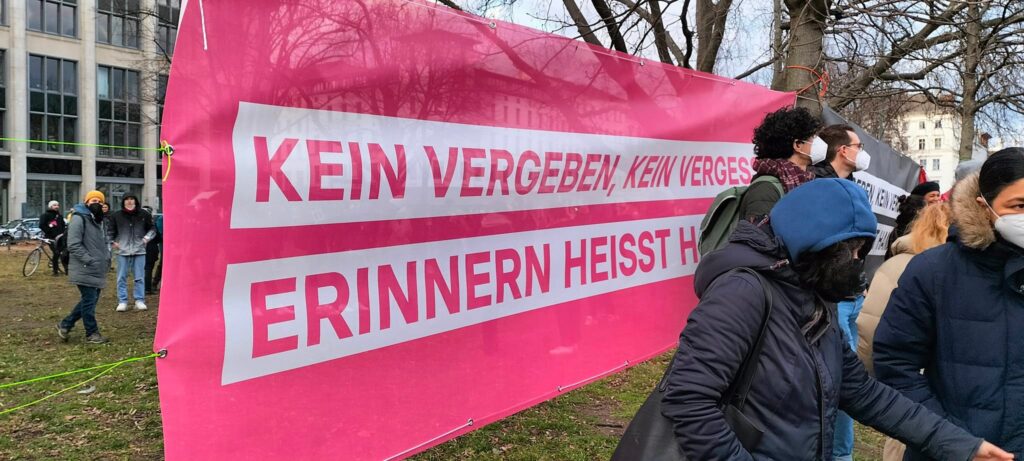
Photo Gallery – 2 years Hanau
Memorial rallies at Leopoldplatz (Wedding) and Oranienplatz (Kreuzberg), 19th February 2022
The Left Berlin
21/02/2022
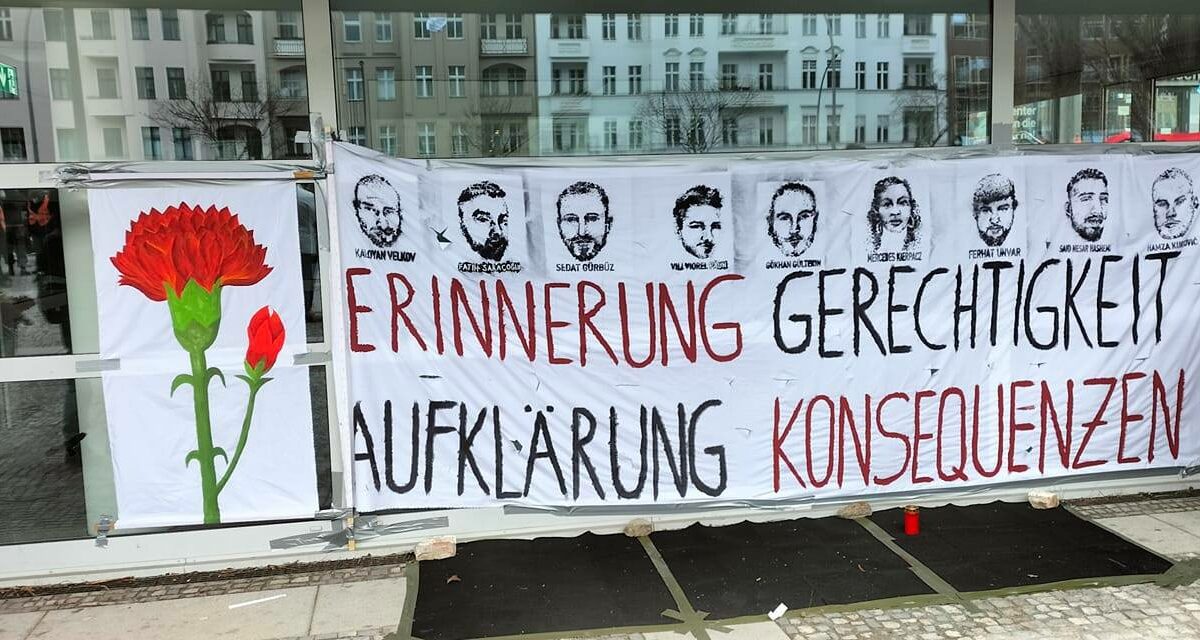
Memorial rallies at Leopoldplatz (Wedding) and Oranienplatz (Kreuzberg), 19th February 2022
The Left Berlin
21/02/2022





























An initiative for EU legislation that will end illicit trade and profits from war crimes and human rights abuses
The Left Berlin
20/02/2022

To mark the World Day of Social Justice on February 20, a coalition of more than 100 civil society organizations has launched a European Citizens Initiative (ECI) to stop trade with illegal settlements in the occupied territories.
An ECI is an official instrument for democratic participation of citizens in EU policy making. If an ECI garners one million signatures from EU citizens over 12 months the European Commission must consider and debate the petition’s demands. This ECI demands EU legislation to outlaw trade with illegal settlements, anywhere and at all times, including trade with Israel’s illegal settlements in occupied Palestine. The coalition calls on every EU citizen concerned about human rights, social justice and fair trade to sign the petition.
Even though illegal settlements constitute a war crime under international law, the EU currently allows trade with them. In the case of Israel’s settlements, the UN Security Council has called on states to render them no assistance. The European Union has repeatedly declared that they constitute a flagrant violation of international law. Nevertheless, the EU continues to trade with them, which has emboldened their ongoing expansion.
Tom Moerenhout, a legal scholar and one of the initiators of the ECI:
“The EU has been shamefully inconsistent in its respect of the rule of law. Indeed, the European Commission first rejected registration of our Citizens Initiative, but had to change its position after we successfully sued the Commission before the European Court of Justice. The Commission has since acknowledged it can implement a general rule to stop illegal settlement trade that is considered a general measure in respect of international and EU law rather than a sanction.”
This European Citizens Initiative is carried out by the #StopSettlements coalition. It includes prominent civil society organizations in the field of human rights, environmental and social justice, trade unions and politicians who unite against profits from annexation and occupation to protect human rights, fair trade, and international peace.
Members of the coalition
The #StopSettlements coalition is a wide alliance of NGOs, grassroots movements, trade unions and politicians who unite against profits from annexation and occupation to protect human rights, fair trade, and international peace and stability.
Besides current atrocities such as Israeli settlements in Occupied Palestine, the coalition monitors the trend of territorial aggression in international relations. It wants the EU to send a clear signal that the hard lessons we learnt through history will be remembered and protected, and that profiteering from annexation and occupation will no longer be possible.
These are the coalition partners that support the initiative and request the Commission to regulate commercial transactions with Occupant’s entities based or operating in occupied territories by withholding products originating from there from entering the EU market.
European/ International:
Belgium :
France:
Finland:
Germany:
Luxembourg:
Ireland:
Italy:
Slovenia:
Spain:
Other European:
For more information about the Initiative, please contact Tom Moerenhout (tom@stopsettlements.org), Aneta Jerska (aneta@stopsettlements.org) or consult the #StopSettlements coalition website.
Interview with Tom and Carol from Radio Berlin International
Phil Butland
19/02/2022

Hi Tom, Carol. Thanks for agreeing to talk to us. Could you start by briefly introducing yourself and say what your relationship is to Radio Berlin International?
Carol: I’m Carol McGuigan. I presented the last program and was delighted to do that.
Tom: I’m Tom Wills, and I’ve been producing each episode of Radio Berlin International.
Radio Berlin International was launched at the end of last year. Tomorrow sees its fifth broadcast. How do you think it’s going so far?
Carol: I think it’s a very positive development in terms of this sphere of audio political news gathering, by giving a platform to activists. There aren’t that many platforms where people can do that.
Tom: I think it’s especially important that we’re talking to people who are actually organizing things and who are looking for people to get active. This can be lacking in left media. There can be a lot of analysis, which is very good, but less about people who are organizing stuff.
That doesn’t mean that everyone has to have a protest coming up. But it’s been great to have groups come in like the No Borders group who can talk about concrete actions. When you talk to people about events that are coming up, you already feel more connected to what they’re doing than if you were just handed a flyer or if you see the event on the internet.
Who do you think your main audience is, and how well are you connected to this audience?
Tom: One of the joys and mysteries of FM radio is that it’s hard to know how many people are listening. It could be 10, it could be 10,000. We do solicit emails from people, but we’re yet to really find out. However, we did a piece on an exhibition by Palestinian artists in Berlin and my partner was there and overheard people saying they’d heard about the exhibition on the radio.
The Berlin audience aren’t necessarily tuned into the German language. An English language broadcast is more accessible to them. But we also hope that we’ll reach people who are more confident with their German because we have such an internationalist focus.
I also hope that we will reach some people outside Germany who have an interest in what’s going on here. For example, Victor Grossman’s Berlin bulletin was about the Ukraine conflict is something that is relevant to people all over the world. I hope that we can also be of interest to people outside Berlin as well.
Carol: I think it’s a sort of word-of-mouth thing, because I would imagine that if somebody is going to be on it, they’ll tell their comrades and people they know. It’s available on the website, so it’s not like you have to tune in exactly on the Sunday. It’s the norm nowadays that people listen digitally rather than in real time.
I think the audience will build because of that. The range of issues is good and pertinent, whether it’s a Berlin-specific thing like the building of the deportation centre at the airport or something Germany-wide like the Hanau Massacre.
It takes time for a critical mass of audience to build up. But the more people are on it, they will exponentially build the audience. I hope that will be the case.
You mentioned the website. The radio program started as an offshoot of theleftberlin.com. What’s the connection between the two?
Tom: I definitely think we need both, if only for the mundane fact that some people like to read articles on the internet and some people like to listen to the radio. If I’m cooking or walking with the baby, there are times when I might be listening to the radio or a podcast, but there’s no way I’d be reading an article.
Something like half the population listens to the radio at some point during the week. It’s an important medium, and as the left, we’re missing something if we don’t try to provide some good radio.
Our work with the website collective is doing really well. When the website publishes a Campaign of the Week, they ask us if we want to speak to the campaign and invite them on the radio. Hopefully this will also happen in the opposite direction.
It’s not just about providing the same information in a different format. It’s a kind of connection to Berlin and the real world, which in some ways radio encourages. This allows us to pick up on things that are not necessarily so easy to pick up on when we’re doing text articles.
Carol: I would just add that there’s something about hearing someone’s voice that really humanizes whatever campaign they’re involved in. This makes it more accessible. When you read text, you can have presumptions about who is speaking. Whereas when you hear them speak and know they’re directly involved in what’s happening, you just hear the commitment in their voice, that they’re a real person, and you could join in with that.
Could you say something about reboot.fm, who host the programme?
Tom: They’re a long-standing artists-run community radio station. They’ve been going for at least 10 years and broadcast a lot of interesting experimental music. They have a few political talk shows, but not so many. Some of this stuff is in German and some of it is in English.
We approached them because they seemed to be a good fit in terms of the politics. They already cover some politics in German, and they immediately said they were interested in what we wanted to do. They’ve been a great support. They provide the studio and of course, they’ve got the infrastructure set up to actually broadcast.
If you’ve actually got an FM radio in your house and you tune into to 88.4 Megahertz, you can hear some interesting music. I think it’s a great platform, a great package of different material that it’s really good to be part of.
Carol: I was kind of vaguely aware of reboot.fm because I know one of the founders a little. But going to the tiny studio, then looking at the website, the diversity and breadth of stuff is so impressive.
Tom: I would also say actually part of the reason why I started listening to the radio more was that I wanted to get off social media and this never-ending information overload as well. If you’re not in the habit of having the radio on in the house, I would recommend giving it a try.
But I also like the fact that with radio, that if I’ve missed it, I’ve missed it. I’m not going to worry that I’ve missed something. If I happen to be in the kitchen and have the radio on, then I’ll catch something. If I don’t, I don’t, and I’ll get on with my life, and I’m not going to feel this burden of having a long list of things to read or a long list of things to listen to necessarily. So I do like the ephemeral nature of it as well.
You anticipated the next question, which is about the format. Radio feels a bit old-school. Every second person has got a podcast, yet you’ve launched a radio programme. Is there a reason for choosing this particular format?
Carol: I’ve listened to a couple of podcasts who say that their intention is to bring political issues into the public domain. And some of the podcasts seemed to prioritize a cool joshing before they get started on anything serious – sometimes even in the middle of serious bits.
They’re laughing and joking with each other and it feels like you’re eavesdropping on some mates who know each other hanging out and having a convo. I find that totally off-putting. It might be a generational thing, but I just never listen again. I just want to get to what the subject matter is.
So, I think there’s definitely room for a straighter, more direct reporting form of political radio from the left, especially with invited interviewees speaking more than the presenters. I don’t think that this is necessarily peculiar to radio. But there is something about the podcast thing where people think “This is my little project, and I’m going to make it all about me”. And after a while, that’s not that interesting. Sorry.
Tom: That’s a really important point. Also, on the radio, we can play music because FM has the license to do that. So that’s another whole dimension that we can use, which is not possible for podcasters.
We also have a fixed broadcasting schedule every two weeks, which means that we must be quite disciplined to get everything into that time. But I hope the result is something that people feel will be worth listening to. In those 60 minutes we’ll hopefully cover things that people are really glad to find out about.
In the interviews on the broadcast, you usually ask your guests to choose 1 or 2 pieces of music which relate to the interview. To put the boot on the other foot, which music would you choose to represent what you are trying to do?
Carol: I’ve got two suggestions. One of them was from a piece of street theatre that I saw last year that was staged in Kreuzberg, and it was a German protest opera called Lauratibor, which is an amalgam of the names of two streets in danger of gentrification. For me, affordable housing and the resistance to gentrification is a huge topic in Berlin. The song was at the end of the of the piece and it’s called “Widerstandslied” or “Resistance Song”.
Also just because of the hysterical beating of war drums in the Anglosphere, I would choose a track by Lowkey as an antidote, which is called “Refuse to kill”. It’s a beautiful track featuring the singer Kaia Laurielle.
Tom: My choice is a bit obvious: “The Revolution will not be Televised” by Gil Scott-Heron. I think this is relevant because on the one hand, we’re kind of trying to televise the revolution or at least put it on the radio. And he’s obviously completely right about the problems with the mainstream media.
We should also keep in our heads that the revolution won’t be televised and that there will be limits to what we’re doing on the radio. It does not replace organizing in your workplace or going on a protest march or any of these things. It’s a companion to those activities, but it isn’t the revolution, it’s media. It’s important, but we should also be clear about the limits of it.
This article is being published the day before the next programme on Sunday, 20th February. What have you got planned for tomorrow? And what else have you got in line for the future?
Tom: At the moment we’re expecting Christopher from the Essen Retten Leben Retten protests in the studio. He’s one of the environmental activists who’s been blockading motorways in Berlin, demanding a new law to stop food waste as part of efforts to tackle climate change. We’re also expecting Stefan Huth, who is the editor of the Junge Welt Newspaper as it’s their 75th birthday. We’ll be asking him about running a Marxist newspaper in a capitalist world.
Carol: I think it would be also good to kind of revisit campaigns. So, for example, with the No Borders assembly, to invite Coco back to see what the developments have been. At the show which I presented, Leila couldn’t come because of illness. It would be good to invite her on after the actions.
I’m really glad to hear you’ve got someone coming on talking about climate actions. And the health situation is important, particularly in hospitals. There are developments happening with the nurses in times of pay and conditions. This just seems to get left out by the mainstream media. There’s all this talk about vaccine passports and anti-vax protests, but hospitals being overwhelmed does not get investigated in the same way.
The other important issue is housing. There are all these empty properties in Berlin where people could be living. This must be addressed
One last question. People have read this article thinking Radio Berlin International is something they might like to get involved in. What can they do, and how can they contact you?
Carol: First, I don’t think non-English speakers should be put off. There is a script, so it’s not like have to kind of make it up on the spot. It would be good to get a big a range of committed people as possible.
Tom: I would also love for people to get involved in producing the show. Also, it’s really fun. It’s a lot about talking to people, listening to music, meeting people face to face as well. It’s a really nice way of being involved in that media.
Presenting doesn’t have to take up too much time. In theory, someone could just turn up an hour before the broadcast, get a quick briefing on what’s going on, and then go on air. At the same time, the presenter is a really important role because you are asking the questions.
People always do adapt to the script a little bit, based on their own ideas. Presenting is a really nice way to get involved, but there are other things. Say you are interested in going to a protest and doing a report about what’s happened, interviewing people, that kind of thing. This makes really, really interesting radio. We can give people the equipment and the know-how.
There’s also producing, which is really just a fancy word for organizing the guests and making sure that they’re there at 7:00 p.m. on Sunday. It’s really fun because you get to talk to lots of different people and be part of the programme as well, even if you don’t necessarily say anything. If that sounds interesting to you, email us at radio@theleftberlin.com.
Radio Berlin International broadcasts every second Sunday on Reboot FM 88.4 MHz in Berlin, 90.7 MHz in Potsdam and live online at reboot.fm. The next live broadcast will be on 20th February at 7pm, and will include an interview with Stefan Huth, editor-in-chief of the junge Welt newspaper.
The Amnesty report on Israel is a contribution to the liberation of Palestine – but we must go further
Michael Sappir
17/02/2022
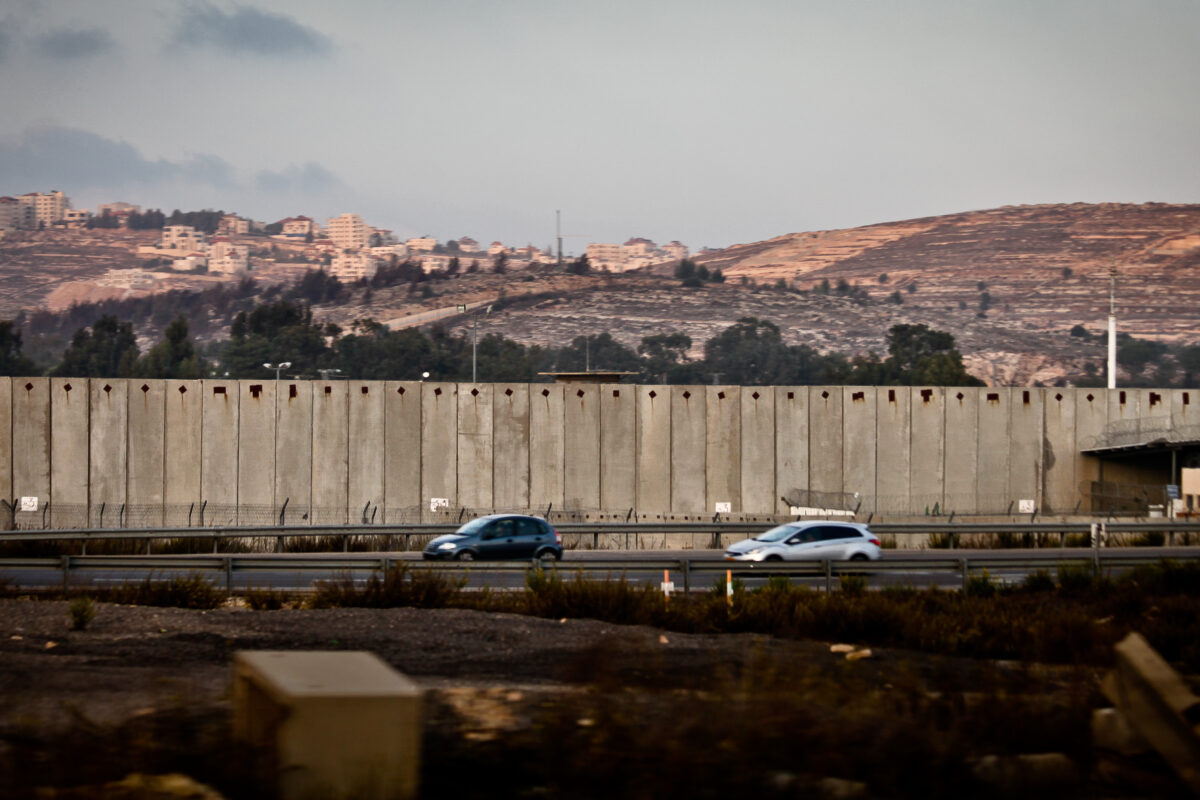
One of the greatest difficulties when speaking about Palestine/Israel in Germany is in the terminology. People socialized in Germany are regularly shocked at how we, who come from the country, casually talk about “the Jews” and “the Arabs” rather than “Israelis and Palestinians”. But that’s just the everyday speech in the region, both in Hebrew and Arabic. This terminological categorisation is based on real divisions. People are sorted above all into these two categories, and treated differently on that basis.
Unlike other modern nation-states, the State of Israel does not understand itself as a state of all its citizens – in Israel this phrase is seen as an extreme left provocation – and not even as a state of its Jewish citizens, but rather the state of the Jewish people as a whole. This means that non-citizens who are classified as Jewish officially enjoy significant rights which are not available to citizens categorised as non-Jewish.
The largest non-Jewish minority among Israeli citizens is the 20 per cent who are classified by the State as “Israeli Arabs”. On top of this there are the ca. 4½ million Palestinians living under the occupation, a separate (in)justice regime. In everyday Israeli life, this distinction is also a spatial separation; there are “Arab cities”, “Jewish cities” and “mixed cities”, in which there are in turn separate districts.
People rarely move into the other group’s area: the separation is consistently promoted by the State. Against the background of such systematic institutionalised separation between “Jews” and “Arabs” a further discussion about terminology comes about: can we call it Apartheid?
The new report from Amnesty International has come to a clear answer: yes, we can. The knee-jerk defensive reaction of representatives of the Israeli government was loud, even before the report appeared.
In Germany, many wanted to stifle the debate before it could begin: right from the start, the use of the term Apartheid in relation to Israel was dismissed as antisemitic. Conveniently, they can then avoid paying attention to the basis of these grave allegations.
Known Facts, Explosive Ramifications
The report presents the results of more than four years of collective research. It systematically addresses the question of whether Israel’s policies regarding the Palestinians reach the threshold of the crime of Apartheid.
The report makes it clear that this is not about a direct comparison with South Africa, but about whether Israeli policies correspond to the legal meaning of “Apartheid”. According to Article II of the 1973 UN Convention against Apartheid , this would mean “inhuman acts committed for the purpose of establishing and maintaining domination by one racial group of persons over any other racial group of persons and systematically oppressing them”.
The aggressive reactions to the report are not just because Amnesty agrees that the threshold has indeed been reached. Even though the evidence on which the report is based comes largely from previous research, e.g. from the reports from Human Rights Watch and B’Tselem, the report marks a development in a number of ways.
The first is that the scope of the analysis is broader than in most international reports. As has long been the case in the Palestinian narrative, the whole territory of the State of Israel is examined as a systematic whole. This includes the “core area” (including the annexed Golan Heights and East Jerusalem) together with the occupied Palestinian territories.
It is notable that the report identifies the roots of the system in the formation of the State in 1948, and discusses the treatment of Palestinian refugees and their descendants. The latter is a central issue for the Palestinian liberation movement, and is equally important for understanding Israeli actions.
The recommendations of the report are also explosive: the report calls upon the State of Israel to dismantle the Apartheid system. It also urges all countries and the UN to deploy all political and diplomatic tools to ensure that the Israeli authorities really do comply with this demand.
For example, Amnesty calls for an international criminal investigation of the State of Israel and many of its politicians. The report also points out that countries which have signed the anti-Apartheid Convention are obligated to promptly investigate suspected perpetrators of Apartheid in their territory and bring them to justice if necessary. This obligation applies to Germany as well.
We should also not overlook that the recommendations (including an arms embargo, sanctions, companies reviewing their investments, and a boycott of settlement products implemented by governments) represent limited forms of boycott, divestment and sanctions.
Not Security But Demography
In Germany, even some “left wingers” condemn any accusation of Apartheid while refusing to address the evidence. There is a different discussion in the Israeli Left. It is accepted that Israel is practising Apartheid in the West Bank – that is obvious by now. The question is, though, whether the term also applies to the system inside “Israel proper”.
Some therefore accuse the report of ignoring the “Green Line” – the former border between Israel and the Palestinian territories occupied since 1967. The opposite is true: one of the greatest strengths of the report is that it shows how different legal apparatuses on either side of the Green Line are part of one comprehensive system of Israeli control.
As the writer Nathan Thrall argues, this dividing line does not form the border between two different régimes, but merely between different variants of a single régime of separation. According to Thrall, the excuse of separate régimes allows liberal Zionists and foreign governments to energetically support Israel while ineffectively condemning the occupation. In this way, Apartheid and land seizure can proceed unabated.
The Amnesty report explicitly attacks the current legitimization of separation and land seizure. According to the report, “security requirements” could justify some of these measures, but not all of them, not by a long shot. This includes, for example, the segregation of residential areas and restrictions to family life, such as the law preventing Palestinians who marry Israeli citizens from moving across the Green Line to live with them.
The report brings out the basic organisational principles of the Israeli régime from behind the veil of “security requirements”: demographics and territorial control. Even the supposed killer argument used by Zionist propagandists – that there are Arabs in parliament – gets cut down to size: The political participation of Palestinians in every Israeli territory is restricted, although not in exactly the same way everywhere.
Even “Arab Israeli” (that is Palestinian) MPs are not allowed to question the definition of the country as a “Jewish State”, nor implicitly the 65 laws which legitimate their marginalisation and unequal treatment. Palestinians in the West Bank have as good as no right of assembly, while in the official State territory this right is systematically curtailed by aggressive police and public prosecutors.
Underlying Structure of Settler Colonialism
In the solidarity movement for Palestinian liberation, the report has been praised for recognising Apartheid for what it is. But it has also been rightly criticised for not naming the cause – settler colonialism. This weakness should worry not just Palestinians and us socialists on their side, but everyone who is honestly concerned with the antisemitic abuse of such accusations. Without naming the causes, one remains mystified as to why Israel carries out such cruel politics.
A materialist analysis, sensitive to (settler) colonial dynamics, demystifies the emergence of such a system and makes it clear that Apartheid is an expression of settler colonialism. Patrick Wolfe taught us it is “not an event, but a structure”, which wherever it exists, pursues a “logic of elimination of the native” in manifold ways.
As soon as people flee to a country in order to found a new society, the dynamic of settler colonialism takes hold. As a settler colonial structure, the State of Israel’s obsessive worry about control and demographics and its urge towards expansion are no exception, but the rule.
Indigenous people who do not submit to the settlers’ aims must be cleared away. In North America, Europeans were able to do this primarily through genocide. In Palestine, the ethnic cleansing of 1948 could not go so far. Instead, the remaining indigenous people were geographically restricted and controlled. In order to keep them and their inevitable resistance under control, a system of separation and oppression is required – in one word: Apartheid.
Decolonisation now!
Research and reports have interpreted the oppression of Palestinians in various ways. The point, however, is to end it. The Amnesty report can contribute to this. It gives a clear view of how the problem is structured, bringing together vast amounts of evidence in a legally relevant and reviewed context. This is helpful as a means for consciousness-raising, for legal struggles and for diplomacy.
But the demand that the State of Israel dismantle its Apartheid system verges on senselessness. The diagnosis contained in the report makes it clear that Israeli Apartheid cannot be separated from the Israeli political system. If we take these findings seriously, we must conclude that what is needed is decolonisation. This is also the demand of the Palestinian liberation movement. The bourgeois pressure recommended by Amnesty is a contribution towards such a revolutionary change – but on its own, it is insufficient.
The decisive actors in a decolonial struggle are above all the colonised people. But the Palestinians currently lack the united, determined leadership which has the broad, organised support of all parts of the Palestinian people, efficiently fragmented by Israeli rule.
On the other hand, overcoming settler colonialism means – unlike the national liberation from classical exploitation colonialism – a reconstitution of the political community, including every settler prepared to live together with indigenous people on the basis of equal rights for all.
This implies an important role for Israelis. Unfortunately, only a vanishing minority among the Israeli Left is prepared to accept this role. The liberal Israeli forces known as the “(Zionist) Left” aspire towards a less brutal régime of separation and oppression, for sustainable Zionist control in Palestine.
But a successful decolonisation only requires a small minority of the settler society. This minority will surely grow when a united Palestinian leadership shows the way forwards. Both require active solidarity from internationalist socialists around the world. Our task is to apply pressure so that our own imperialist countries no longer enable the support of settler colonialism in Palestine!
Michael Sappir is an Israeli writer and organizer based in Leipzig. He currently studies philosophy and organizes with Jewish-Israeli Dissent (JID Leipzig) and Die Linke.SDS. This article originally appeared in German in Lower Class Magazine. Translation: Phil Butland. Reproduced with permission.
178k deaths proclaim that Boris Johnson spectacularly failed to ‘get all the big calls right
John Puntis
16/02/2022

Keep Our NHS Public continues to fight vigorously on a number of different fronts as Covid, austerity and government abandoning all pretence of following the science wreak havoc. Meanwhile, the NHS is further threatened by proposals in the Health and Care Bill. With Health Secretary Sajid Javid declaring that Britain is the freest country in Europe, and the ending of all Plan B restrictions, it might appear that the pandemic is all but over.
The requirement to isolate for those with infection is due to lapse on February 24th. Statistics, however, tell a different story and this is clearly a decision based on political rather than scientific considerations. The Omicron variant has swept the board, and while less likely to cause severe disease, it has a very high rate of transmission.
In early February, there were around 160,000 new symptomatic cases each day, and 14,600 infected hospital inpatients. Daily deaths from Covid have regularly been over 250 (1 every 6 minutes!) with a peak of 276 on the 17th January, the highest daily total since 23rd February 2021. The Office for National Statistics has recorded over 178,000 Covid-related deaths since the start of the pandemic.
To many, the possibility of a new and more lethal variant remains a huge threat, augmented by high levels of circulating infection – a strong argument for ensuring vaccination is rolled out across the world. Recently, 320 academics have pressed the government for support to Low- and Middle-Income Countries to manufacture Covid vaccines, tests and treatments.
In addition, much more must be done to suppress community transmission and reduce the likelihood of a new serious mutation. Low rates of infection would then permit public health measures such as ‘test, trace, isolate, support’ to control further spread of virus. The misleading narrative that we are learning to live (should this be ‘die’?) with Covid is contributing to what the Commons joint committees’ report correctly characterised as among the worst ever public health failures in our history.
One of the highest rates of death in proportion to population gives the lie to the much-parroted phrase that the prime minister got all the big calls right. Such delusional thinking means that the NHS is now on a ‘war footing’, with waiting lists massively increasing and many people being denied the care they need.
The Health and Care Bill
This Bill addresses none of the most pressing problems in the NHS. It has been described succinctly as: “an astonishing attempt to allow the Secretary of State, an enlarged NHS England as ‘rule-maker and regulator’, and new public-private ‘Integrated Care Boards’, to reduce services, limit expenditure, further degrade local accountability and entrench the market.” No wonder legislators are finding it difficult to explain to voters just what benefits patients might expect it to deliver. While this Bill should be rejected outright, parliamentary arithmetic suggests this won’t happen, and campaigners have been lobbying for amendments that could ameliorate some of the worst effects. However, there is no indication that any important revisions will be forthcoming.
The start of Integrated Care Systems (central to the Bill) has been delayed from April until July in recognition that further debate is now unlikely to be completed in time for Royal Assent at the end of March. The committee stage in the Lords is almost over following which the report stage gives a further opportunity for the Lords to discuss and make amendments. The Bill then returns. The Bill then returns to the Commons when key votes will take place on amendments proposed
With the 2012 Health and Social Care Bill, it was noted that many Lords had private interests in insurance companies, private health care and private equity groups, and were in danger of voting on behalf of private and personal interests that stood to gain from the Bill rather than in the public interest. It is likely that situation is not much changed. For example, Lord Hunt of Kings Heath has proposed that 5% of budgets must be ring-fenced for digital transformation. The Parliamentary Register of Interests shows him as the paid Chair of the Advisory Board for Octopus TenX Health, a health technology investment company.
‘SOS NHS’: building a movement so massive, loud and strong that the government simply cannot ignore
The recent People’s Covid Inquiry organised by Keep Our NHS Public highlighted the effects of austerity in undermining the NHS, weakening its ability to respond to the pandemic. The final report concluded that there may be the basis for criminal proceedings related to charges of misconduct in public office; the Metropolitan police have been asked to investigate. The Inquiry raised the question of what kind of NHS and care system we need in the future.
SOS NHS is an ambitious new campaign supported by around 40 key organisations. It represents a diverse range of people, united in their desire to defend the NHS against neglect, underfunding and privatisation. The central demands are for an immediate £20 billion in extra spending as a down payment to start rebuilding a fully functioning public health and care system; investment in a publicly owned NHS and guarantee of free healthcare for future generations; proper pay for staff.
The recently announced recovery plan falls far short of what is needed. It lacks sufficient investment and fails to address workforce issues without which promised improvements simply can’t happen. Mental health, GP services and urgent and emergency care are not covered, all of which are in dire trouble. The 5,000 beds closed during the pandemic are not being reopened and more cash is being directed to private sector providers.
SOS NHS has called for a national day of action on 26th of February with events being held in many towns and cities. One lesson to be learned from pandemic spending is that money can always be found if there is political will.
This article was written for Chartist no 315, March/April 2022 edition. With thanks to Mike Davis for permission to reproduce.